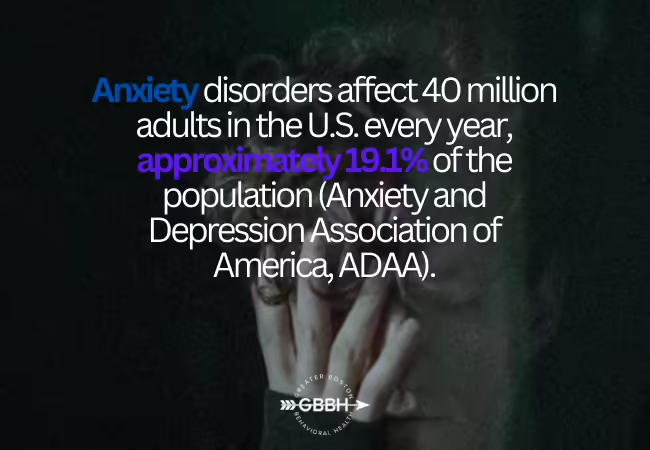Anxiety is one of the most prevalent mental health concerns in the United States, affecting millions of individuals across all age groups. While occasional anxiety is a natural response to stress or danger, chronic or excessive anxiety can interfere with daily life, relationships, and overall well-being. Understanding anxiety, its impact, and strategies for managing it are essential for reclaiming control and finding balance.
For residents in Boston, accessing resources such as an Anxiety Treatment Program, Depression Treatment Program, and structured care options like Intensive Outpatient Programs (IOPs) or Partial Hospitalization Programs (PHPs) at a Mental Health Treatment Center in Boston can make a significant difference. This guide provides an in-depth look at anxiety, its symptoms, effects, and actionable steps for management.
What is Anxiety?
Anxiety is a mental health condition characterized by excessive worry, fear, or nervousness about future events or uncertain outcomes. While anxiety serves as a protective mechanism in dangerous situations, persistent or disproportionate anxiety can lead to significant distress and functional impairment.
Types of Anxiety Disorders
Anxiety manifests in various forms, with each type having distinct characteristics:
- Generalized Anxiety Disorder (GAD): Persistent and excessive worry about everyday life events, such as work, relationships, or finances.
- Social Anxiety Disorder: Intense fear of social situations or being judged negatively by others.
- Panic Disorder: Recurrent panic attacks marked by overwhelming fear, chest pain, and shortness of breath.
- Specific Phobias: Irrational fear of specific objects, activities, or situations, such as heights or flying.
- Obsessive-Compulsive Disorder (OCD): Repeated intrusive thoughts (obsessions) and compulsive behaviors aimed at reducing anxiety.
- Post-Traumatic Stress Disorder (PTSD): Anxiety resulting from exposure to a traumatic event, leading to flashbacks, avoidance, and hypervigilance.
Symptoms of Anxiety
Anxiety can manifest in a variety of ways, affecting an individual’s emotional, physical, and cognitive functioning. The symptoms can range from mild to severe and may differ depending on the type of anxiety disorder. Recognizing these symptoms is essential for identifying the need for intervention and seeking appropriate support.
1. Emotional Symptoms
- Persistent Worry: Constant feelings of apprehension or dread, often unrelated to specific situations.
- Irritability: Heightened emotional sensitivity, leading to frustration or anger over minor stressors.
- Fear of the Unknown: An intense focus on potential negative outcomes, even in seemingly safe scenarios.
2. Physical Symptoms
- Rapid Heartbeat (Palpitations): A racing heart, often accompanied by a feeling of tightness in the chest.
- Shortness of Breath: Difficulty breathing or a sensation of suffocation, especially during moments of heightened anxiety.
- Sweating and Trembling: Excessive perspiration and noticeable shaking, even in calm environments.
- Gastrointestinal Issues: Nausea, diarrhea, or stomachaches commonly associated with anxiety.
- Fatigue: Persistent tiredness, even after sufficient rest, due to the body being in a prolonged state of alertness.
3. Cognitive Symptoms
- Racing Thoughts: An inability to slow down or organize thoughts, often leading to mental exhaustion.
- Intrusive Thoughts: Unwanted and repetitive ideas or images that increase worry or fear.
- Difficulty Concentrating: Struggling to focus on tasks or retain information due to preoccupation with anxious thoughts.
- Catastrophic Thinking: Exaggerating potential dangers or worst-case scenarios, leading to heightened distress.
4. Behavioral Symptoms
- Avoidance: Deliberately steering clear of situations, places, or people that trigger anxiety.
- Restlessness: Difficulty staying still, often accompanied by pacing or fidgeting.
- Changes in Sleep Patterns: Insomnia or excessive sleeping due to worry or fatigue.
- Reliance on Coping Mechanisms: Overeating, smoking, or substance use to temporarily alleviate anxiety symptoms.
The Impact of Anxiety on Daily Life
When left untreated, anxiety can significantly affect various aspects of an individual’s life, creating challenges in emotional well-being, relationships, work performance, and overall health.
1. Emotional Well-Being
- Chronic Stress: Persistent anxiety creates a heightened state of stress, leading to emotional exhaustion and burnout.
- Reduced Self-Esteem: Feelings of inadequacy or constant self-doubt can erode confidence and contribute to a negative self-image.
- Co-Occurring Disorders: Anxiety often overlaps with conditions like depression, amplifying emotional challenges and complicating treatment.
2. Relationships
- Social Withdrawal: Individuals with anxiety may avoid social situations or interactions, leading to feelings of isolation.
- Communication Barriers: Difficulty expressing feelings or concerns due to fear of judgment or misunderstanding can strain relationships.
- Conflict with Loved Ones: Heightened irritability or mood swings may lead to disagreements or hurt feelings in personal relationships.
3. Professional and Academic Challenges
- Reduced Productivity: Anxiety can impair focus, decision-making, and task completion, negatively impacting performance at work or school.
- Missed Opportunities: Avoiding important meetings, presentations, or academic challenges due to fear or worry can hinder progress.
- Workplace Conflicts: Difficulty managing stress or responding to feedback constructively may lead to tension with colleagues or supervisors.
4. Physical Health
- Stress-Related Illnesses: Chronic anxiety increases the risk of conditions such as high blood pressure, heart disease, and digestive issues.
- Sleep Disturbances: Ongoing insomnia or disrupted sleep patterns weaken the immune system and exacerbate physical symptoms.
- Chronic Pain: Muscle tension, headaches, and other physical manifestations of anxiety can reduce overall quality of life.
5. Quality of Life
- Diminished Enjoyment: Anxiety can prevent individuals from fully engaging in hobbies, social events, or family activities.
- Financial Strain: Medical costs for managing anxiety-related symptoms and missed workdays can create additional stress.
- Long-Term Impacts: Untreated anxiety increases the risk of substance abuse, relationship breakdowns, and difficulties maintaining stability in personal and professional life.
Strategies for Managing Anxiety
Managing anxiety requires a multifaceted approach, combining self-care practices, coping strategies, and professional support.
1. Self-Care Practices
- Mindfulness and Relaxation Techniques:
- Deep breathing exercises, meditation, and yoga can help calm the mind and reduce physical tension.
- Grounding techniques, such as focusing on the present moment, can redirect anxious thoughts.
- Physical Activity:
- Regular exercise, such as walking, swimming, or cycling, releases endorphins that improve mood and reduce anxiety.
- Healthy Lifestyle Habits:
- Maintaining a balanced diet, limiting caffeine and alcohol intake, and prioritizing sleep can enhance emotional and physical resilience.
2. Coping Strategies
- Identify Triggers: Keeping a journal to track situations that provoke anxiety can help identify patterns and develop proactive strategies.
- Cognitive Restructuring: Challenge negative or irrational thoughts by replacing them with more balanced perspectives.
- Time Management: Breaking tasks into smaller, manageable steps can reduce feelings of overwhelm.
3. Build a Support Network
- Talk to Loved Ones: Sharing your feelings with trusted friends or family members can provide relief and validation.
- Join a Group Therapy Program: Engaging with others who understand your experiences can foster connection and support.
4. Seek Professional Help
For individuals whose anxiety significantly impacts their daily life, professional care is essential for long-term management.
- Therapy-Based Interventions:
- Cognitive-Behavioral Therapy (CBT): Focuses on identifying and changing negative thought patterns and behaviors.
- Trauma Therapy Program: Addresses anxiety stemming from past traumatic experiences.
- Medication Management:
- Anti-anxiety medications, antidepressants, or beta-blockers may be prescribed to manage symptoms effectively.
- Structured Programs:
- Intensive Outpatient Programs (IOPs): Provide regular therapy and support while allowing individuals to maintain daily responsibilities.
- Partial Hospitalization Programs (PHPs): Offer a higher level of care with daily therapeutic sessions and medical supervision.
Why Professional Support is Crucial
Professional care offers individualized solutions that address the root causes of anxiety while equipping individuals with practical tools for long-term success.
Benefits of Seeking Professional Help
- Accurate Diagnosis: Professionals can distinguish between different types of anxiety disorders and co-occurring conditions.
- Personalized Treatment Plans: Therapy and medication are tailored to meet each individual’s unique needs and goals.
- Ongoing Support: Structured programs and aftercare services ensure continued progress and prevent relapses.
How Greater Boston Behavioral Health Can Help
At Greater Boston Behavioral Health, we are dedicated to providing comprehensive mental health care to individuals struggling with anxiety. Our evidence-based programs are designed to address the unique challenges of each individual, offering a path to recovery and improved well-being.
Our Services Include:
- Anxiety Treatment Programs: Specialized care for managing chronic or overwhelming anxiety.
- Depression Treatment Programs: Support for co-occurring conditions that often accompany anxiety.
- Trauma Therapy Programs: Evidence-based interventions for anxiety linked to past trauma.
- Family Therapy Programs: Tools to strengthen communication and relationships.
- Group Therapy Programs: A supportive environment to connect with others and learn coping strategies.
- Intensive Outpatient Programs (IOPs) and Partial Hospitalization Programs (PHPs): Structured care for those needing intensive support.
Final Thoughts
Anxiety can feel overwhelming, but it is manageable with the right combination of self-care, coping strategies, and professional support. By addressing anxiety early and seeking help when needed, you can regain control and build a more balanced and fulfilling life.
If you or a loved one is struggling with anxiety, Greater Boston Behavioral Health is here to help. Contact us today at (888)278-0716 to learn more about our programs and take the first step toward recovery and well-being.
FAQs About How to Deal with Anxiety
What are the common symptoms of anxiety?
Symptoms include:
- Emotional: Persistent worry, fear, or irritability.
- Physical: Rapid heartbeat, sweating, or stomach issues.
- Cognitive: Racing thoughts or difficulty concentrating.
- Behavioral: Avoidance of anxiety-triggering situations.
How can I manage anxiety on my own?
Some effective self-care strategies include mindfulness practices, regular exercise, healthy eating, and maintaining a consistent sleep routine.
When should I seek professional help for anxiety?
If anxiety significantly interferes with daily life, relationships, or work, it’s essential to seek help through therapy or structured programs like Intensive Outpatient Programs (IOPs) or Partial Hospitalization Programs (PHPs).
What types of therapy are effective for anxiety?
- Cognitive-Behavioral Therapy (CBT): Helps reframe negative thought patterns.
- Trauma Therapy Programs: Address anxiety stemming from past experiences.
- Group Therapy Programs: Provide peer support and shared coping strategies.
Can medication help with anxiety?
Yes, medications such as antidepressants or anti-anxiety drugs may be prescribed by a mental health professional to manage symptoms effectively.
What services does Greater Boston Behavioral Health offer for anxiety?
We provide:
- Anxiety Treatment Programs
- Depression Treatment Programs
- Trauma Therapy Programs
- Family and Group Therapy Programs
- Intensive Outpatient Programs (IOPs) and Partial Hospitalization Programs (PHPs)
How can I get started with treatment?
Contact Greater Boston Behavioral Health at (888)278-0716 to learn more about our programs and begin your journey toward better mental health.


